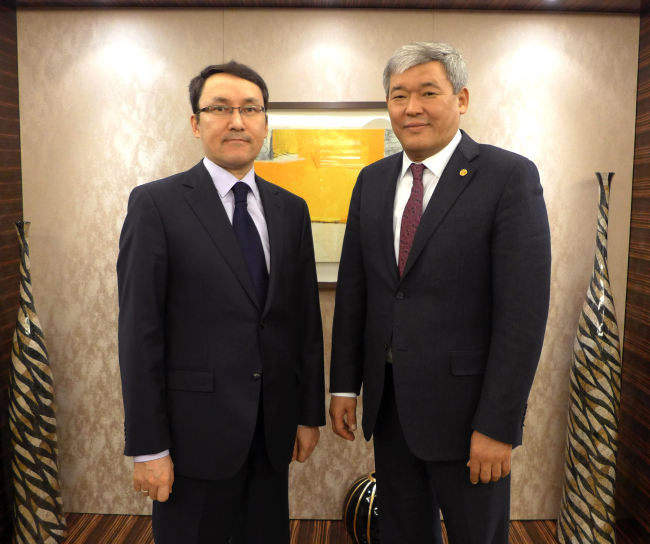Kazakhstan’s Foreign Deputy Minister Rapil Zhoshybayev visited Korea in late March to promote the Astana Expo 2017 and garner Korea’s support.
The international exposition in Kazakhstan’s capital of Astana will feature “future energy,” showcasing innovative and environment-friendly solutions to global energy needs.
“Astana will be a platform to present to the world where Kazakhstan stands in its transition to renewable energy as well as scientific research and development,” Zhoshybayev told The Korea Herald on March 20. “Kazakhstan has traditionally relied on coal, oil and gas, but is turning to renewable energy to fight climate change.”
More than 2 million people from 100 countries and 10 international organizations are expected to participate in the event to be held between June 10 and Sept. 10, 2017. Twenty-five hectares are designated for pavilions, with easy access to the city center, airport and railway stations.

The deputy minister said his country decided to host the event following Kazakh President Nursultan Nazarbayev’s declaration to nurture green energy at the 2012 United Nations Conference on Sustainable Development in Rio de Janeiro.
As a national project targeting “green growth” as part of “the third industrial revolution,” the international exposition will search for solutions to combat climate change and reduce CO2 emissions; promote alternative energies; ensure energy security; manage energy production, storage and use; and guarantee universal access to sustainable energy.
The venue is expected to be a catalyst for continuing innovation in science and lifestyle, “becoming an integral part of life in the republic,” said the deputy minister.
Kazakhstan is currently diversifying energy sources by building two nuclear power plants alongside wind and solar power stations, Zhoshybayev said. It is also strengthening energy independence alongside international projects involving Europe, Russia, China and other regional and Asian countries.
“We have learned from Korea’s experience hosting the Yeosu Expo 2012, including selection of the ideal site, concerts and cultural events for attracting young people, reusing buildings for housing, and transport and logistics for tourists,” Zhoshybayev said. “It is my pleasure to welcome Korean friends to Astana before and during the expo to experience the dynamism and hospitality of Kazakh people.”
The deputy minister pointed out tourist attractions in Astana, including the Palace of Peace and Reconciliation and Khan Shatyr Entertainment Center designed by British architects Foster and Partners; Green Water Boulevard by Japanese architect Kisho Kurokawa; Bayterek Tower; and Ak Orda Presidential Palace.
Zhoshybayev met his Korean counterpart Cho Tae-yul and delivered an invitation to President Park Geun-hye.
He signed a memorandum of understanding between the National Company Astana Expo and Korea Tourism Organization, and expressed hope for future bilateral collaboration on renewable energy research, information technology and automobile sector.
By Joel Lee (joel@heraldcorp.com)



